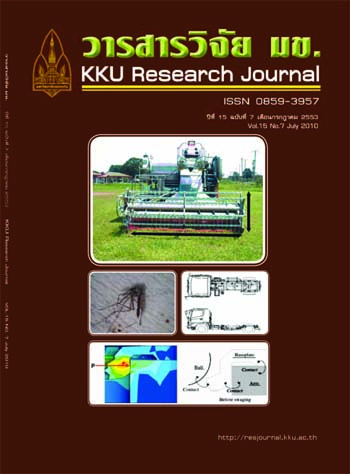controlling on adult dengue mosquito (Aedes aegypti) dissemination by using green Muscardine fungi Metarhizium spp. and protease (pr1) gene cloning (Thai)
Main Article Content
Abstract
Adult dengue mosquito (Aedes aegypti) is an important vector of human diseases. Reduction of adult mosquito population, especially in dissemination time is an effective control method of disease epidemic. This study was emphasized on reduction of insecticide application to control mosquito by using entomopathogenic fungus. The green muscardine fungi, Metarhizium spp. 15 isolates selected from collection in the northeast of Thailand were investigated for efficiency on controlling adult dengue mosquito. Quantitative protease (Pr1) activity was evaluated among Metarhizium isolates. Enzyme activities were ranked 3.36 to 379.21 tyrosine (μmol) / mg protein / hr. The 3 high protease activities were isolates IPKKU 218, Lop2/2 and IPKKU 216 with values 379.21, 100.07 and 64.43 tyrosine (µmol)/mg protein/hr, respectively. The pathogenic test of these fungi on dengue mosquito revealed percent mortality rates of 28.67 - 81.33%. The highly effective isolates with mortality percentage in parenthesis were Lop2/2 (81.33 %), IPKKU 218 (78.00 %) and IPKKU 216 (71.33%), which were not significantly different (P>0.05). DNA fragment coding protease gene (pr1) from the most effective isolate (Lop 2/2) against Ae. aegypti and the high Pr1 activity was amplified by polymerized chain reaction (PCR) using primers, Pr1F1 and Pr1R1. The obtained PCR product was ligated to plasmid (pDrive cloning vector) and transformed to QIAGEN EZ competent cell. The selected clone was isolated, extracted for plasmid containing target PCR product and submitted for base sequencing. The base sequences were compared by subjection the sequence to GenBank database and found that it was similar to elastase-like serine protease from Metarhizium anisopliae (AB073327) with 96% similarity. This research indicates the good effectiveness of green muscardine fungus, M. anisopliae in controlling adult dengue mosquito directly. It can also be exploited in integrated management including the application of protease encoding gene (pr1) for increasing either the protease production using genetic engineering technology or the effective control on adult dengue mosquito and other pests.


